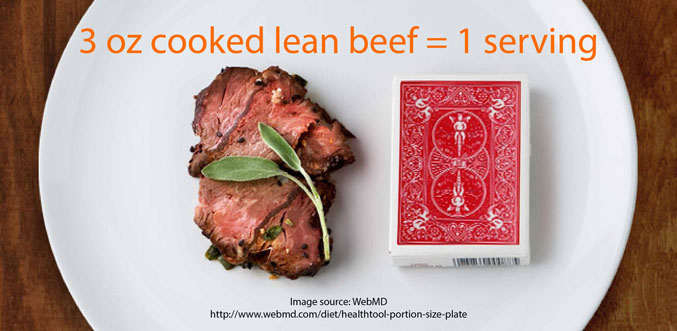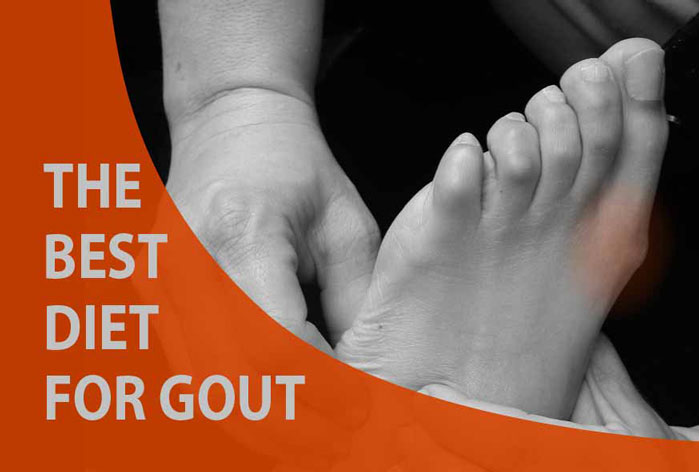Gout is a painful inflammatory arthritis that is caused by monosodium urate crystal formation in a joint. The key to reduce gout flare-ups is to reduce uric acid levels in the blood,(1) and the good news is that it is curable.(2)
Most of those who have gout know that they need to be watching their diet. But when I ask these patients what kind of diet they are on, the answers are all over the place. Most of them seem uncertain what foods are good for them, and what foods they should avoid.
I am going to make a list of the most current dietary guidelines. If you or your loved ones have gout, check your/their diet against the list below and see how you can be more effective at managing the condition.
Foods to avoid
-
Red meat
Eating too much red meat causes gout.(3) According to a 2016 review, every extra meat portion you eat a day increases your risk of gout by 21%.(4) And keep in mind that a serving of meat is not a lot.

-
Purine-rich animal protein
This includes organ meat, beef, lamb, pork, and shellfish.(1) We used to think all purine-rich foods need to be avoided, including legumes, beans, and mushrooms, etc. But newer studies have proven, again and again, that purine-rich vegetables do not increase the risk of gout. (3-6)
-
Alcohol
The risk of gout increases after just 1-2 standard drinks.(4) More specifically, beer is the worst. Spirits are better than beer, but worse than wine.(1)
-
Soft drinks, fruit juices and beverages sweetened with high-fructose corn syrup (1,3-5,7)
Fructose and sweetened beverages are new risk factors for gout we didn’t know about until a few years ago.(3) Fructose increases uric acid levels as a byproduct of ATP metabolism. (1)
Foods to eat
- Vegetables (including purine-rich vegetables), nuts, legumes, fruits (less sugary ones), whole grains (5,7)
- Low-fat dairy products (1, 3,5,7)
- Vitamin C supplementation and Coffee
Some studies (5,7,8) show that vitamin C and coffee can lower uric acid levels, and lower the risk of gout. However, stronger evidence is needed to validate the association.
Conclusion
If you must have a name to the diet, the Mediterranean diet is recommended for those with gout, as the diet is associated with lower uric acid levels. (4, 9,10)
Since we are talking about diet for gout, a disease of affluence, I want to share a quote from Colin Campbell, PhD.
“There is no such thing as a special diet for cancer and a different, equally special diet for heart disease. The evidence now amassed from researchers around the world shows that the same diet that is good for the prevention of cancer is also good for the prevention of heart disease, as well as obesity, diabetes, cataracts, macular degeneration, Alzheimer’s, cognitive dysfunction, multiple sclerosis, osteoporosis and other diseases.”
References:
- Hainer BL, Matheson E, Wilkes RT. Diagnosis, treatment, and prevention of gout. Am Fam Physician. 2014 Dec 15;90(12):831-6.
- Rees F, Doherty M. Patients with gout can be cured in primary care. Practitioner. 2014 Dec; 258(1777):15-9, 2.
- Alvarez-Lario B, Alonso-Valdivielso JL. [Hyperuricemia and gout; the role of diet]. Nutr Hosp. 2014 Apr 1;29(4):760-70.
- Nickolai B, Kiss C. [Nutritional therapy of gout]. Ther Umsch. 2016;73(3):153-8.
- Torralba KD, De Jesus E, Rachabattula S. The interplay between diet, urate transporters and the risk for gout and hyperuricemia: current and future directions. Int J Rheum Dis. 2012 Dec;15(6):499-506.
- Teng GG, Pan A, yuan JM, Koh WP. Food Sources of protein and risk of incident gout in the Singapore Chinese Health Study. Arthritis Rheumatol. 2015 Jul;67(7):1933-42.
- Choi HK. A prescription for lifestyle change in patients with hyperuricemia and gout. Curr Opin Rhaumatol. 2010 Mar;22(2):165-72.
- Zhang Y, et al. Is coffee consumption associated with a lower risk of hyperuricaemia or gout? A systematic review and meta-analysis. BMJ Open. 2016 Jul 8;6(7):e009809.
- Kontogianni MD, et al. Adherence to the Mediterranean diet and serum uric acid: the ATTICA study. Scand J Rheumatol. 2012;41(6):442-9.
- Chrysohoou C, et al. Long-term adherence to the Mediterranean diet reduces the prevalence of hyperuricaemia in elderly individuals, without known cardiovascular disease: the Ikaria study. Maturitas. 2011 Sep;70(1):58-64.
About the Author
Dr. Lily Semrow is a Board Certified Chiropractic Neurologist who focuses on Neuro-Structural Correction. She has a B.S. in Nutrition and a doctorate in Chiropractic. She has a passion for serving families, and helping people who could not get better through traditional and alternative means.

